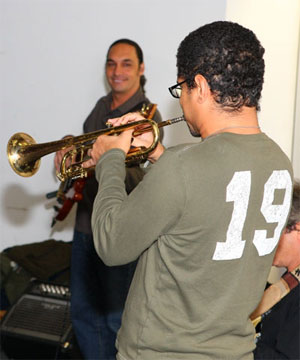 |
| HavanaFax's Jasek Manzano on the trumpet. (Nick Pearce Photo) |
Jasek Manzano makes an arc of his body: his feet are planted apart and his torso bows forward. His fingers fly over the trumpet valves as he blows.
His heels lift off the ground and it seems like he’ll tip over: he’s so concentrated on the music.
The students in John Kirk’s Cuban Cultural Revolution class noisily sound their approval: they clap and woo-hoo as they rise out of their desks for a standing ovation. While the trumpet player seizes the opportunity to breathe, the other Cuban members of HavanaFax – Jorge Chicoy on guitar, Avi Garcia on bass, Tony Rodriguez on keyboard — smile and wave their thanks.
“That was fun,” says second-year student Kathleen Sinclair as she gathers up her books. “So great to mix it up a little.”
Hearing that the Cubans were in Nova Scotia for a month, Dr. Kirk was eager to bring them into to his class (). As the name suggests, Havanafax is comprised of professional musicians from Havana and Halifax. The band is in town to record a new CD. Its last recording, HavanaFax Live, won an East Coast Music Award for best jazz recording in 2004.Â
The band is an extension of Los Primos (“the cousins”) Project. Begun by Jeff and Amara Goodspeed, the project initially involved collecting and refurbishing musical instruments and bringing them to Cuban schools. An exchange program followed, bringing Cuban students to Nova Scotia, and Nova Scotian students to Cuba.
Keyboard player Tony Rodriguez was part of the first Los Primos exchange in 1998 and is now a member of HavanaFax. (Between teaching engagements and recording, the musicians will play Stayner’s Wharf on Sunday, Feb. 10, from 5 to 9 p.m., and an all-ages dance at the Olympic Community Centre, 2304 Hunter St., on Saturday, Feb. 16.)
“I think they really exemplify the importance of music in Cuba,” says Dr. Kirk, professor in the Dept. of Spanish. “If you go to Havana, you can’t avoid live music. It drifts out of every doorway. It's great to give the students a taste of that passion.”
Between songs, the students asked the Cubans questions about the clubs they play in and their musical education. While the instruments they learn on are banged up and in constant need of repair, the level of teaching for children in state-run conservatories is high, says guitarist Jorge Chicoy.
“You do what you can,” says Mr. Chicoy, who’s played with “almost everyone in Cuba” and now backs Omara Portuando, the Cuban singer famous for her appearances with the Buena Vista Social Club. “When I was a kid, the first string on my guitar was from a telephone cable.”
Cubans are fanatical about music, adds Mr. Manzano. “When you have so few options and you want to be a musician, you take one of those options and you go for it. There’s no holding back.”
And now the question is: What will Dr. Kirk do to earn a standing-o for his next lecture?
“I guess I could play the recorder,” he says with a shrug.Â
LINK:
